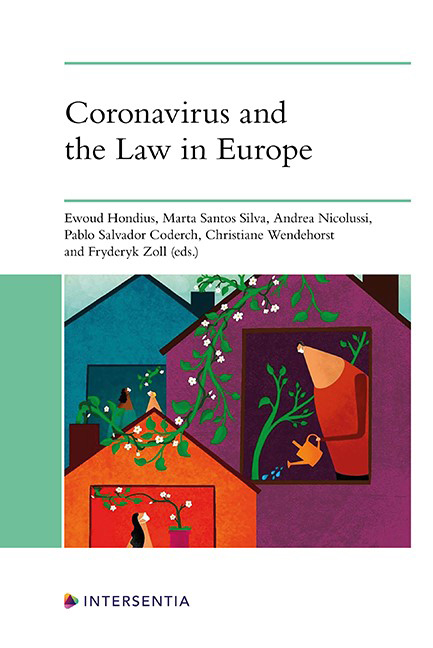Book contents
- Frontmatter
- Preface
- Contents
- List of Keywords
- List of Contributors
- PART I COVID-19 AND FUNDAMENTAL RIGHTS
- PART II STATES AGAINST THE PANDEMIC
- PART III COMPENSATION FOR COVID-19 RELATED DAMAGE
- PART IV CONTRACT LAW
- PART V CONSUMER LAW
- PART VI LABOUR AND SOCIAL LAW
- PART VII CORONAVIRUS CHANGING EUROPE
- Epilogue
- Annex: ELI Principles for the COVID-19 Crisis
- About the Editors
How Did French Administrative Judges Handle COVID-19?
Published online by Cambridge University Press: 10 December 2021
- Frontmatter
- Preface
- Contents
- List of Keywords
- List of Contributors
- PART I COVID-19 AND FUNDAMENTAL RIGHTS
- PART II STATES AGAINST THE PANDEMIC
- PART III COMPENSATION FOR COVID-19 RELATED DAMAGE
- PART IV CONTRACT LAW
- PART V CONSUMER LAW
- PART VI LABOUR AND SOCIAL LAW
- PART VII CORONAVIRUS CHANGING EUROPE
- Epilogue
- Annex: ELI Principles for the COVID-19 Crisis
- About the Editors
Summary
During the COVID-19 crisis, governments resorted to exceptional measures and restricted the fundamental rights of citizens in seeking to get control over the spread of the epidemic. Consequently, control over the governmental measures that were adopted during the Health State of Emergency was in great demand by citizens. In France, the existence of an administrative judiciary allows fast and efficient access to the judge (which is almost free) and ensures judicial control on public freedoms. French administrative courts, particularly the Conseil d‘État, played a crucial role during this period. This was made possible thanks to efficient judicial practices which existed before the COVID-19 crisis, notably the accelerated procedure of “référés”. This contribution analyses these practices over the first few months of the state of emergency in France (March–June 2020).
INTRODUCTION
In May 2020, the European Law Institute (ELI) adopted Principles for the COVID-19 crisis, a set of 15 principles, which are intended to guide European States, EU institutions and other bodies “with the object of ensuring that everything that is done accords with the rule of law and democratic values”. Principle 5 is dedicated to the “Justice system” and its first paragraph provides:
The judiciary should do all that is reasonably practicable to continue to conduct proceedings and trials, particularly through the use of secure video and other remote links where available to the courts. In any case, the judicial system should maintain a minimum level of operations to deal with urgent matters, safeguard the rule of law and provide proper remedies to litigants, provided that the right to a fair trial, including the right to defence, is not infringed. The restrictions on the operation of the judiciary must be immediately removed when the COVID-19 emergency permits.
On 18 June 2020, at an ELI webinar dedicated to the rule of law during and post COVID-19, the speakers were asked to concentrate on the judiciary and its independence and focus their attention upon the challenges in some Member States, especially on the Polish experience as it shows “how weaknesses in a judicial discipline system can be weaponised to seek to bend judges to a ruling party’s political will”. One participant suggested that many countries face similar situations to that of Poland whose constitution offers strong guarantees of judicial independence and that, consequently, the Polish experience can be a cautionary tale for other countries as well.
- Type
- Chapter
- Information
- Coronavirus and the Law in Europe , pp. 81 - 92Publisher: IntersentiaPrint publication year: 2021

